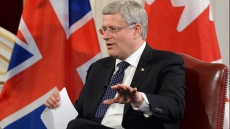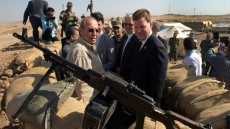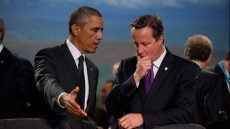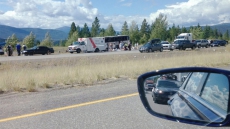VANCOUVER - With a decision imminent on the Site C hydroelectric project in northeastern British Columbia, area First Nations have delivered a message to the provincial government: You can have the dam or you can have liquefied natural gas but you will not get both.
The $8-billion dam would lie in the heart of B.C.'s nascent LNG industry.
Chief Roland Willson of the West Moberly First Nation said his community has title to the Peace River valley under an 1899 treaty, and a recent decision from the Supreme Court of Canada has bolstered their say in any industrial development on that land.
The band is not opposed to resource development, Willson said, but it has issued an ultimatum.
"I've said you can't have both," Willson said in an interview. "If you want to push Site C, we're not going to be in favour of any LNG projects, any of the pipeline projects up there. We don't want to be there but if that's the case, we don't have any other choice."
Willson will be in Ottawa today with Chief Liz Logan of the Fort Nelson First Nation and Grand Chief Stewart Phillip of the Union of B.C. Indian Chiefs to deliver that message to the federal government, which must issue its own decision on the project.
The dam would be the third on the Peace River in B.C., flooding 5,550 hectares of land over an 83-kilometre stretch of valley. It would generate an estimated 100 megawatts of capacity, or enough to power the equivalent of 450,000 homes a year.
A report by a joint federal-provincial environmental assessment panel in May made no clear recommendation.
Energy Minister Bill Bennett said announcements are expected on environmental certificates from the federal government and the B.C. Environmental Assessment Office next month. If Site C is given the go-ahead, a final decision from the province could come in November.
"Clearly we would like to have at least some of the Treaty 8 First Nations, as many as possible, involved with the actual project — their contracting firms getting business out of it, their people getting jobs out of it," Bennett said in a recent interview.
"Obviously, with no First Nation formally in support of the project at this time, we still have lots of work to do."
But there is a treaty in place, so the recent Supreme Court of Canada decision on land title may not have much bearing on this particular project, he said.
The Crown-owned utility, BC Hydro, has said it needs the dam to provide for future needs and meet the province's legislated clean energy targets.
Ken Boon, a rancher whose land will be under water if the project proceeds, said he hopes the West Moberly band can convince the province to find an alternative.
"I think if they had to choose between the two, they'd choose LNG," he said. "I don't think the government really has the appetite to get into a big litigation battle with First Nations over Site C."
Willson said the area cannot bear the environmental impact of both LNG and the dam.
"It's too much," he said. "We're already inundated with gas activity. When you look at that, well, they can't have both."
The Peace region is responsible already for 60 per cent of the province's resource revenue, he said.
"Yes there has to be development," Willson said. "But you can't continue to develop and push constitutionally protected treaty rights off to the side. They're at a point now where they've grossly crossed over those lines."






